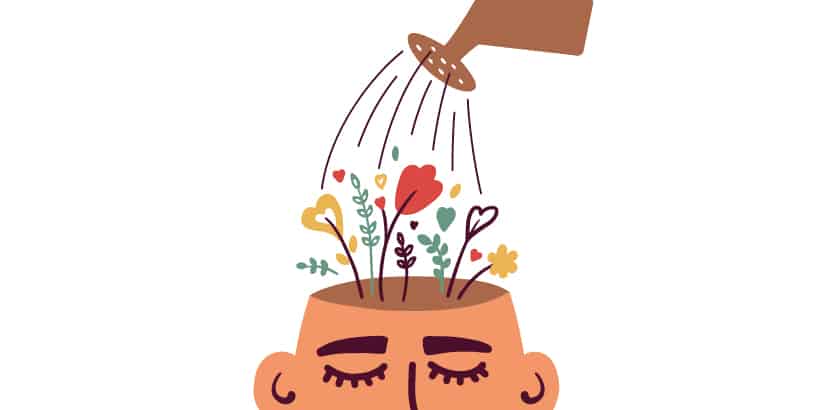by JJ Draper, Youth Engagement Specialist
Discussions around mental health have become more prominent in mainstream culture, with our collective awareness shifting towards more empathy and compassion around the topic, a significant improvement from the decades of stigma and shame placed around it. Multiple factors have contributed to this collective awareness: prominent TV shows that put a spotlight on mental health (such as the 2019 hit drama Euphoria), social media conversations around mental health on large platforms like X and Facebook, and the advancement of research on mental health studies.
While it is amazing that collectively our awareness has shifted for the better, we still have a long way to go in actively supporting individuals on their mental health journeys, most notably in youth. The Green Bay Press Gazette recently published that half of Wisconsin youth have been diagnosed with depression, anxiety, or general behavioral problems. These findings from the Wisconsin Office of Children’s Mental Health noted that young girls, children ofcolor, and LGBTQ+ youth are among the most highly affected. The youth that participated in the report noted the following key stressors that contribute to a decline in mental health:
- Academic pressure
- Widespread gun violence
- Climate change
- Discrimination
- Political divisiveness
- Family stress
The report expands on sources of stress, such as a lack of childcare resources, poverty, housing, and other systemic issues that directly affect a child’s emotional, social, and mental well-being.
To put some of these findings into perspective, I wanted to share a personal story about my own struggles with mental health that correlates with the findings of the OCMH report. I am just entering my late twenties, which puts me on the older end of Gen Z. Growing up, my grandmother retired early in her 50’s to help take care of me when I was a toddler, as my mother could not work, nor afford to keep me in daycare. As I got older, I moved around often to different schools and neighborhoods’ on Milwaukee’s north side, and even ended up moving multiple times back and forth from Wisconsin to Alabama as my parents sought out better opportunities to support our family. While I understood why we needed to move around so much, I missed out on being able to develop long-lasting relationships with other children my age, and by the time that I got to my new school, it was harder for me to integrate myself with other children who already had more established friendships in the middle of the school year. I had a childhood that lacked stability, and with coming into my identity as a dark-skinned Black and Queer person as a teenager, I struggled a lot and kept it to myself. I didn’t even understand what I was going through, since mental health was a taboo discussion in my family. I didn’t want to raise any alarms to my mother, who was often proud of how independent and driven I was because I had to be. Towards the end of my high school years, my grades were starting to decline, and the mask I was wearing for so long was starting to crack under the pressures that came with the impending expectations of adulthood.
I dropped out after completing my first semester of Southern Illinois University due to poor mental health and being hours away from my immediate family. After transferring to UW-Milwaukee the following Fall, I completed another semester of college. Things seemed to be looking up for me since I was going to school in my hometown. I was making friends, working two jobs, and commuting an hour to and from school on the city bus Monday through Friday. I started the first day of spring semester completely fine, and eager to continue down this path. I remember getting on the hour bus ride back home that day and started seriously thinking about the future and how uncertain I felt about it, which resulted in an anxiety attack that landed me in Roger’s Memorial Hospital for a week.
I transitioned to their outpatient programming Monday through Friday for about three months. It wasn’t until I went through their programming that I realized that I still had a lot of healing to do, despite having changed my life around with making close friends and working hard at school. I thought I was on track to doing what I was supposed to be doing: go to college, get a job, buy a car and a house. I put a lot of pressure on myself to “do well” because of how I grew up, which was a huge contributing factor to me crashing to the point of hospitalization. Since that experience and with the support of my mom, I have been able to develop better coping skills to deal with my stress, and have learned critical skills in boundary setting, saying no, establishing safety plans, and other skills in cognitive behavioral therapy and dialectical behavior therapy.
I share this story as a means of emphasizing just how critical early intervention can be for young people who are struggling with mental health due to stressors that are completely out of their control. As a parent myself now, I have to consider that my struggles with mental health may very well be genetic, and make sure that I am doing my part in supporting my child’s wellbeing. This could look a myriad of different ways, and Iwould encourage parents, mentors, and teachers to try to meet emotionally disregulated children with more understanding, patience, and care.
Individual ideas to consider:
- Open communication and active listening. Adults can make mistakes and cause harm, even if that isn’t our intention. Come to conflicts or expressed hardship from youth with an open mind and heart.
- Be Mindful of Signs. Pay close attention to changes in behavior, sleep patterns, or academic performance. You can visit OCMH’s website for information on resources, toolkits, printable tools, and more.
- Promote Self-Esteem. Encourage activities that make youth feel good, such as hobbies, crafts, fun community events, etc.
- Seek professional help. There is no shame in needing to consult professionals to support a child showing severe signs of a decline in mental health. Consider support from a therapist, counselor, or other mental health professional.








Leave A Comment